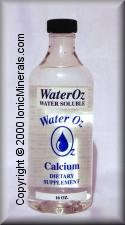 Calcium is required
for the release of energy for muscular contraction and effects the release of
neurotransmitters at synaptic junctions; it helps with ADD/ADHD and PMS.
Calcium is required
for the release of energy for muscular contraction and effects the release of
neurotransmitters at synaptic junctions; it helps with ADD/ADHD and PMS.
Calcium Mineral Water is made of 99.8% pure calcium in a water soluble
form that is readily available for assimilation by the human body.
Calcium is the most abundant mineral in the human body, a man weighing
150 pounds contains approximately 3 pounds, 12 ounces of calcium in his body. Calcium is
one of the first elements in the body to go out of balance when the diet is inadequate.
Calcium is used in forming bones, also known as bone mineralization, and in the proper
formation and maintenance of teeth. It is also important in nerve impulse transmission,
blood coagulation and muscle contraction.
Vitamin D (sunshine) and Magnesium are
essential to the proper absorption and assimilation of calcium. Calcium is required for
the release of energy for muscular contraction, mediates the transport function of cell
and organelle membranes, effects the release of neurotransmitters at synaptic junctions,
and mediates the synthesis, secretion and metabolic effects of hormones and enzymes.
Calcium also helps regulate muscle tone, muscle receptiveness to nerve stimulation and the
regulation of the heart beat. Calcium is an alkaline, positive mineral that has a powerful
attraction for oxygen. Other elements with which calcium readily associates are sulfur,
silicon and carbon.
Calcium, until recently, has only been available in a compound if it is
not derived from the diet. Compounds require enzyme function to break the molecules apart
so that the body may use the single molecule of calcium, the building blocks of the body.
Some of the more common compounds are silicates, phosphates, carbonates, nitrates,
sulfates, chlorides, hydroxides, fluorides, and oxides. Colloids are commonly calcium
phosphate and calcium fluoride. Calcium also heightens pH in the body, making it more
alkaline thereby enhancing the immune response as virus's and bacterium die in an alkaline
environment.
Below is a list of conditions that Ionic Calcium may assist in preventing
or help with: